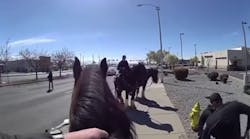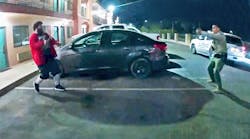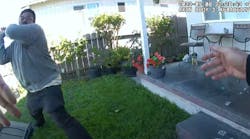MILFORD, Conn. -- When Officer Maria Frey approached a car she had just pulled over, an inconspicuous partner was watching the driver's every move.
A tiny video camera attached to the officer's sunglasses recorded the woman handing over her license and registration. Shorter than a pen and weighing half an ounce, the device also captured -- clearly -- every word spoken between them.
Milford police bought a dozen of the cameras in February, using money seized from drug dealers. The department, which has 112 officers, intends to buy more of the cameras, which cost $1,000 each. Milford joins other departments that use such cameras, including Hartford and Branford and soon Hamden and Danbury.
Many officers say the cameras are great tools for gathering evidence and guarding against false complaints. But some have questions about their use and whether they invade people's privacy, such as when an officer is in someone's home.
Video from the cameras -- which make a loud beeping sound every 30 seconds while recording -- can be viewed by officers on their cellphones although the version is choppy. They can't change or delete it, and they can't download the video.
Milford officers are expected to leave their cameras on once an interaction has begun.
"Turning it off during an interaction would be unacceptable unless it was necessary to protect the privacy of someone such as a crime victim or a juvenile," said Milford Chief Keith Mello.
Favored By Officers
Branford has had body cameras for more than a year and officers like them, said Capt. Geoffrey Morgan. They are designed to be worn on an officer's chest, as opposed to the model used in Milford.
"They reduce the amount of sustainable complaints against the police officers," Morgan said, and they increase officer professionalism.
When someone complained that an officer had been rude to him, Morgan checked the video and found that the man was swearing at the officer, calling him "a disgrace to the Irish race."
"I put it out to the news media," Morgan said.
The same thing happened in Milford, where use of the cameras is voluntary.
An officer told Milford Lt. Kenneth Rahn that he dealt with a driver who was angry about a ticket, so Rahn looked at the video.
"The officer was more than professional and more than accommodating to the person," he said.
Patrol officers aren't the only ones using the cameras. In Milford, detectives use them to record confessions and people giving consent to search their property. Traffic cops use them at accident scenes, police said.
"It's almost become a source of pride for them," said Rahn, who is in charge of the camera program. "They'll say, 'Hey, when I do motor vehicle accidents, I'll walk around the vehicle to establish where I am.'"
Like many departments, Milford already has cameras mounted on the dashboards of its patrol cars, but they record only what's going on directly in front of the car.
The body cameras, which can be clipped onto sunglasses, a hat or lapel, record everything from the officer's vantage point.
"I look a little like RoboCop," Frey said recently as she put on a pair of Oakley sunglasses with a skinny camera affixed to the right side.
A few hours later, when she saw a Honda Civic turn without a signal down the street from the police station on Boston Post Road, she activated the patrol car's siren and turned on her PVR (personal video recorder). The device beeped twice.
The camera captured the entire interaction, start to finish, including the driver asking why she was pulled over and handing over her paperwork, Frey telling the woman to make sure she uses her signal and letting her go without a ticket. The woman thanked her.
Invasion Of Privacy?
Dashboard cameras, which typically record police activity on public roads, are one thing, but having a camera record everywhere an officer goes is another, said Andrew Matthews, a lawyer who also heads the biggest police union in the state.
"We don't want to violate people's rights," said Matthews, president of the state police union. He was concerned about recordings made inside people's homes.
Also, Matthews said, the cameras could become a labor issue since using such technology can be considered a change in state troopers' working conditions under union rules, he said.
Like Matthews, the American Civil Liberties Union of Connecticut has concerns about video recorded in someone's home, "especially if that video is stored indefinitely," according to an emailed statement from staff lawyer David McGuire.
The way such cameras are used should be considered, too, he said.
"These cameras have a great potential for safeguarding the public and the police and for curbing the use of excessive force," McGuire said. "But if officers can turn them off and on selectively, they will protect only the police and not the public. We've already seen reports from Oakland where officers assigned to crowd control at an Occupy protest had turned their cameras off," he said.
Another body cam controversy happened in Oakland in 2011 when an officer with a chest-mounted camera fatally shot a suspect during a struggle. Police officials were criticized for not letting the officer look at the video before writing his initial report. They later decided that the officer should have been allowed to look at the video.
Controls On Video
The Milford police videos are stored in an online data pool managed by a third party. Videos are deleted after a certain period of time, depending on how they're categorized. Insignificant footage is automatically deleted after 30 days. Video of felony arrests must be erased manually, Rahn said.
The department hasn't had any resistance to the cameras, he said. Union President Dennis Broderick said he didn't have enough information to comment on them.
Many officers -- in Milford especially -- are aware that the cameras may capture poor behavior on the part of police as well as the public.
Early on the morning of June 13, 2009, former Officer Jason Anderson sped down Boston Post Road at more than 90 mph and crashed into a car occupied by two 19-year-olds, killing them. Anderson was fired, and in November, a jury found him guilty of two counts of misconduct with a motor vehicle and one count of reckless driving.
The crash was captured on another officer's dashboard camera. It played a key role in the trial.
Mello, Milford's police chief, understands that the new cameras may capture inappropriate behavior by his officers.
"Transparency adds to our credibility as a law enforcement agency," Mello said. "Even if we're captured doing something that may be potentially embarrassing. Even in the event that it identifies misconduct, then so be it. ... We celebrate our successes and we identify our weaknesses."
"You take your lumps, and you get better."
Copyright 2013 - The Hartford Courant
McClatchy-Tribune News Service


